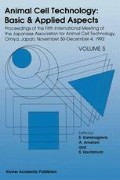Summary
A mouse - human hybridoma, X32 was cultured in a perfusion system with a gravitational settling zone for cell separation. The viable cell density and IgG concentration reached 107 cells/mL and 30 mg/L respectively in 50L scale, which were almost equivalent to those in the smaller culture.
In the case of scaling-up a gravitational settling type of perfusion culture vessel, the larger settling area is required for cell separation in proportion to the culture volume. As the culture volume increases, the cell separation becomes more difficult because it is susceptible to be influenced by any liquid turbulence in the settling zone.
Then, the clear separation of cells from the culture medium was achieved by improving agitation and controlling liquid turbulence in the settling zone. In consequence, we succeeded in 4L, 20L and 50L perfusion culture as in 120 mL one.
The system reported here satisfied the requirement in practical application.
Access this chapter
Tax calculation will be finalised at checkout
Purchases are for personal use only
Preview
Unable to display preview. Download preview PDF.
References
Duff RG (1985) Microencapsulation technology: a novel method for monoclonal antibody production. Trends in biotechnology 3: 167–171.
Himmelfarb P, Thayer PS and Martin HE (1969) Spin filter culture: The propagation of mammalian cell in suspension. Science 164: 555–557.
Lydersen K, Pugh G, Paris S, Sharma P and Noll A (1985) Ceramic matrix for large scale animal cell culture. Bio/Technology 3: 63–67.
Murakami H, Shimomura T, Nakamura T, Ohashi H, Shinohara K and Omura H (1984) Development of a basal medium for serum-free cultivation of hybridoma cells in high density.J.Agric.Chem.Soc.Japan, 58:575–583.
Tolbert W and Feder J (1983) Large-scale cell culture technology. Annual Reports on Fermentation Process 6: 35–74.
Tokashiki M, Hamamoto K, Takazawa Y and Ichikawa Y (1988) High density culture of mouse-human hybridoma cells using a new perfusion culture vessel. KAGAKU KOUGAKU RONBUNSHU 14:337–341.
Hamamoto K, Ishimaru K and Tokashiki M (1989) Perfusion culture of hybridoma cells using a centrifuge to separate cells from culture mixture. J.Ferment.Bioeng, 67:190–194.
Author information
Authors and Affiliations
Editor information
Editors and Affiliations
Rights and permissions
Copyright information
© 1993 Springer Science+Business Media Dordrecht
About this chapter
Cite this chapter
Arai, T., Yokoyama, S., Tokashiki, M. (1993). 50L Scale Perfusion Culture of Hybridoma Cells by Gravitational Settling for Cell Separation. In: Kaminogawa, S., Ametani, A., Hachimura, S. (eds) Animal Cell Technology: Basic & Applied Aspects. Animal Cell Technology: Basic & Applied Aspects, vol 5. Springer, Dordrecht. https://doi.org/10.1007/978-94-011-2044-9_46
Download citation
DOI: https://doi.org/10.1007/978-94-011-2044-9_46
Publisher Name: Springer, Dordrecht
Print ISBN: 978-94-010-4905-4
Online ISBN: 978-94-011-2044-9
eBook Packages: Springer Book Archive

